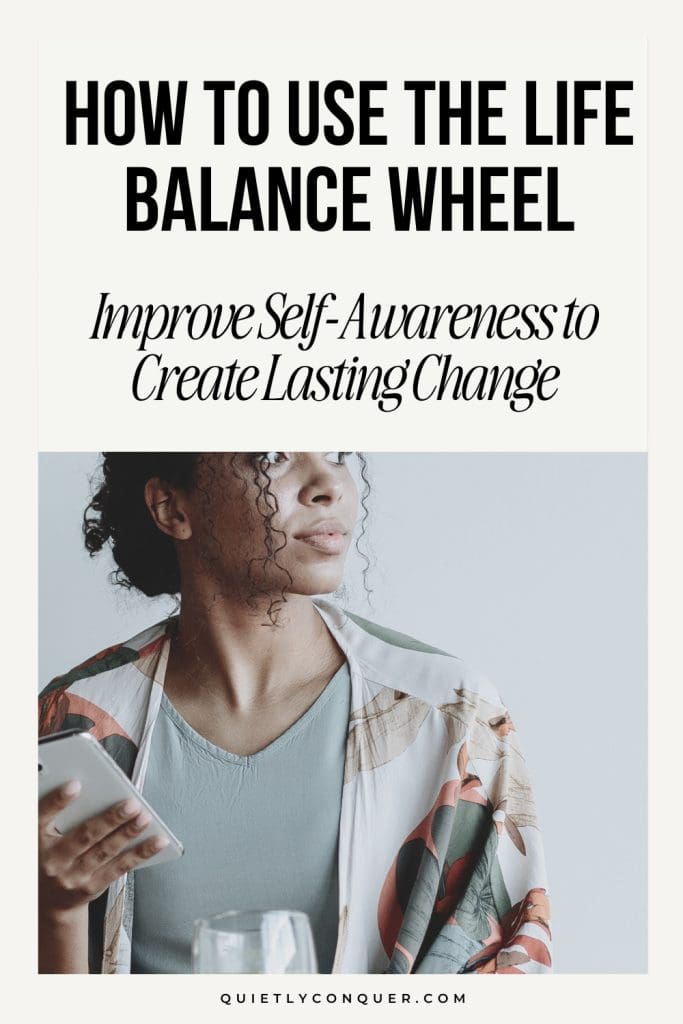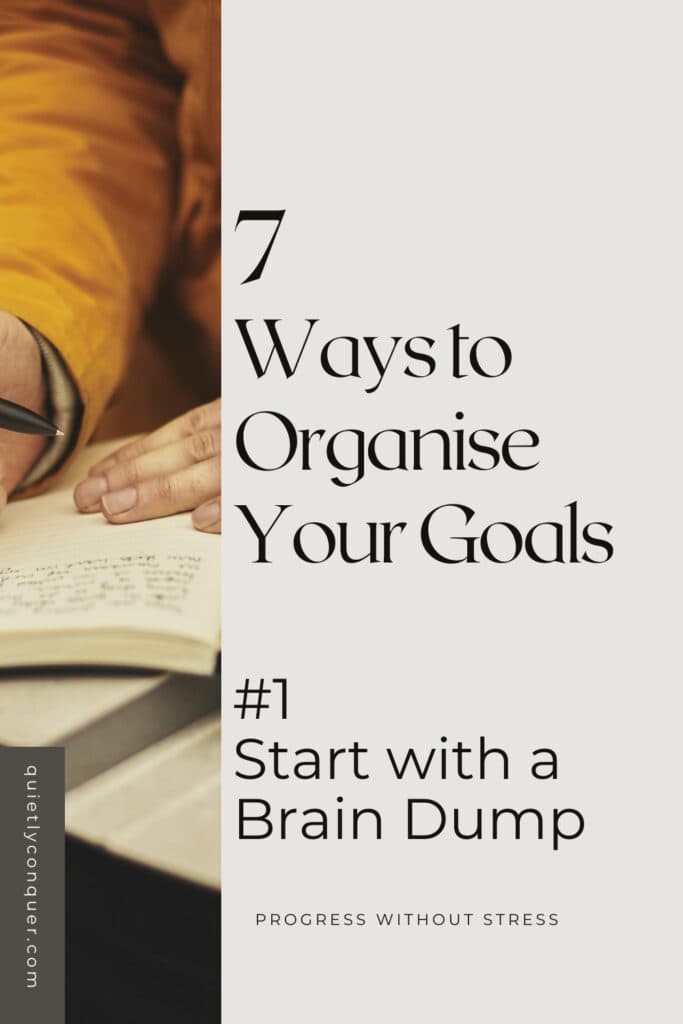New Habits for a Calmer, More Productive Life

New Habits
We hear a lot about “success habits,” but the real power lies in building habits that fit your life, your energy, your priorities, your season.
This post explores some simple ways you can introduce new habits, why goal and intention setting matters, and how to make change stick without overwhelm.
Table of Contents
Goal & Intention Setting
When you're working towards something – whether it's business, training, or personal development, setting clear and achievable goals is essential. Vague goals are hard to focus on. CLear, specific goals and intentions means you can create a clear pathway to follow.
Why it works:
- Reduces decision fatigue: you know your next steps.
- Builds confidence: progress is visible and measurable.
- Prevents “busy work”: effort goes where it's needed.
Getting into the habit of planning what needs to get done and how you need to show up, means that you're setting yourself up to approach the work with confidence. When you are intentional like this, the chances of success are increased.
Helpful approaches:
- SMART(ER) goals: Specific, Measurable, Achievable, Realistic, Time-bound (Evaluate and Re-adjust). There are other variations of this, but SMART(ER) goals are a great place to begin as they give you a decent framework to work from.
- Backwards planning: Start at the end – where you've reached the goal. Then you map your tasks backwards to key checkpoints, back to where you are today.
- Micro-goals: Take each step and make them even smaller. For example a blog post can be broken down into several stages from notes, research, writing the intro, sourcing images, writing sections etc. They can be even smaller than this – it's simply a way to make the next step feel doable now.
Introducing new habits like regular planning that will support your productivity; will help you keep the momentum going. A study carried out by Dr Gail Matthews at a university in California found that you're 42% more likely to achieve a goal that's written down.
Habit Formation & Behavioural Change
Habits are key for successfully bringing about change. It's not always exciting when you're in the process of habit formation, but growth happens when you consistently repeat the actions.
If you struggle with this part of it, you may be good for a couple of weeks then boom, your mojo ups and leaves, this is when you'll need to dig a bit deeper, because you're going against what your brain wants you to do. For example getting up when your alarm goes off!
Humans are creature of habits. Once there's an established habit in place it can become very difficult to stop or change it and often you'll feel very resistant to it if you try to change things.
Accept that when introducing a new habit, it's going to take a while, because you're creating whole new pathways in your brain. Therefore compassion and patience are key, especially if you begin to feel a bit frustrated.
New Pathways for New Habits
Habits may feel a little awkward and forced at first because your brain prefers what it knows. What you're doing now is creating new neural pathways in your brain, and this takes time.
A good way to think of it is this:
Imagine a large garden that stretches on into the woods for miles. It has 2 pathways, and there's one you use every single day. It's tended to, clear, and easy to walk, you know it very well.
One day you notice that the 2nd pathway, has better views, and is a much quicker route.
However, the other pathway is densely overgrown. You can't see the ground beneath the thorns and stinging nettles. The path is bumpy with deep holes, and feels a little dangerous.
It would be SO much easier to just stick to the path that you know wouldn't it?
But, once you begin to walk that 2nd pathway, slowly clearing the brambles, day after day, the ground becomes smoother. You notice that it's not as overgrown as it was before.
You keep walking that way, loving the benefits that you're already experiencing. You can see much more of the scenery around you, and you're already saving time.
By continuing to walk this path, it gradually becomes more and more accessible and easier to walk. It feels more familiar and more comfortable. The other pathway that you no longer walk every day, has started to become overgrown, getting harder to walk on, and feels less safe than it did before.
What this analogy shows is that introducing a new habit isn't going to feel easy at first as it's new. Your brain is used to functioning how it is. You're used to doing things in a certain way, so even though a habit that you want to introduce will undoubtedly change your life for the better, it still feels hard, and your brains instinct is to resist it and stick to what it knows.

There are a few things you can do to make this process feel easier:
Habit Stacking – You attach the new habit that you want to introduce to a habit that's already established. This helps by making the new habit easier to embed into your daily life. It becomes the cue.
Part of my morning routine and it's such a great way is journaling that I attached to my morning coffee routine. It was really easy to slip into and quickly became established.
Other examples:
- As you're brushing your teeth say 3 lines of gratitude in your head.
- As you prepare breakfast set an intention for the day.
- Listen to a relevant podcast on your daily walk.
Prepare the night before to help new habits stick. If you want to go to the gym or get outside for that walk, set your gear out the night before. If you want to start journaling everyday, get it out and ready. Place it next to your coffee cup so you don't have to think about looking for it!
By doing these things the night before, you're making it much easier to walk that new pathway.
What things could you stack new habits to?
Time & Energy Management
Learning how to manage your time and energy will increase your productivity. It will help you work to the best of your ability throughout the day and week. For example, if you know that you work better in the mornings, establish your morning routine so that you make the most out of the time you have.
You don’t need to schedule every minute, but you do need structure that fits your energy.
Some useful strategies:
Time blocking: If your energy is at its best in the morning, use focus sessions and mini breaks when you're focused on your higher energy or most important tasks. The, in the afternoons, focus on tasks that require less energy and concentration.
On low energy days switch to a bare minimum plan. Prioritise one task that you need to work on, and if you are able to, move to lower energy tasks. Prioritise rest on these days to limit the risk of a ‘crash'.
Morning Routine: Mindfulness & Gratitude
You already have a morning routine, it just might not be an intentional one! It doesn't need to be an insta-worthy concept to be valuable. It's just about helping you start your day in the best possible way.
Think about your regular mornings. Do you have an alarm and get up at a certain time? Do you get a glass of water or coffee at a certain point? Do you then begin to get ready for the day; clean teeth, brush hair, dress, or something along those lines?
That's your current morning routine! The next step is to make it more intentional with habits (or micro-habits if time is short), so that you can introduce the habits you'd like to include as well.
A morning routine doesn't have to be an hour long (although if that's what you can and want to do then go for it!). Your morning and evening routine can be merged with what you're already doing using habit stacking, which acts as a cue to help new habits become established quicker.
For example:
Journaling – 5-10 minutes of journaling while drinking your morning coffee. If you're busy with the children, can you wake up 10 minutes earlier, Or, instead of writing, do a voice note journal as you're getting dressed.
Gratitude – As you're cleaning your teeth think of 3 things you're grateful for. Or, include it as part of your journaling time.
Mindfulness – You don't need to fit in a ‘formal' meditation to experience mindfulness. It's a state of mind. Find a moment to pause, focus on your breath and notice your surroundings as you're pottering around.
Remember: New habits are about small, imperfect, but consistent changes.
Accountability & Progress Tracking
What you track you can improve! When you can see the data in front of you, you can learn through identify patterns, noticing things that are working, or things that don't quite feel right.
It's a great way to see what's working well, what isn't working and making changes in the moment to help you stay on track. If for example you only do a quarterly check, you may discover that something from the first few weeks needed tweaking, and had potentially cost you time.
Accountability is another way of helping you stay on track with habits. When you're sharing your goals and intentions with others, or reporting back to someone else what you have done, it can be a great motivator to be able to share progress.
Ideas:
- A weekly check-in with an accountability buddy or support group.
- A habit tracker (paper or digital) with simple daily trackers.
- A Weekly review. Reflect on what worked, what didn't, and what's next.
Remember, humans love rewards, so introducing tracking as one of your new habits will help to keep that motivation high!
Tools, Resources & Support
Take a look at these tools & resources that will help you with achieving goals, and personal growth.
90-Day Planner – This printable 90-Day planner is the perfect companion for you as you set your focus for the next 3 months. Use it every 90 days to help build consistent habits and achieve your goals with ease. With a focus on intentional planning and moving forward at your own space, it's the perfect companion to see you through to the end of the year.
Impact Stationery – Have you ever dreamed of creating your own high-end stationery products? The brilliant Laura has an amazing course & community designed to help you create premium printed products (planners, journals, decks etc.), that you can market on Amazon, or your own website. It's not KDP, these are not print on demand. The quality of the products produced within the community are incredible, with many seeing incredible returns already.
Soft Systems Society – If you want to learn how to use Notion and grab some AMAZING dashboards and more, I highly recommend joining Jakolien. As someone who was scared of Notion and found it too complicated, I now use it daily thanks to the best daily planner system I've ever used. I cannot recommend it enough – my ND brain feels settled, goals are clear, tasks are right there for me to see – so no more decision fatigue, and a much calmer mind.
Final Thoughts
Setting clear goals and intentions when you want to introduce new habits will help you stay on track with your goals, increasing confidence and productivity through having clear steps to follow.
Forming new habits isn't easy and you may feel some resistance as your brain like to keep things as they are! A new habit is like forming a brand new pathway that's overgrown, but as you continue to walk the new path (repeat the actions), it will gradually become automatic.
New habits don't need to be grand gestures. They need to be clear, small and repeatable. They need to be aligned with your goals, your day-to-day life, and your energy.
Routines are a great way to anchor new habits, and making use of accountability can make a real difference. Remember that you're not aiming for perfection when you introduce new habits, this will only add pressure. Give yourself grace, allow yourself to be a beginner, and commit to being consistent.
Over time the new habits will become the most familiar path, and will eventually feel as natural as cleaning your teeth each day!
How will you introduce new habits? – I'd love to hear your thoughts below:
If this post helped or you enjoyed reading it, please share one of the images below as it really helps my blog – Thank You!
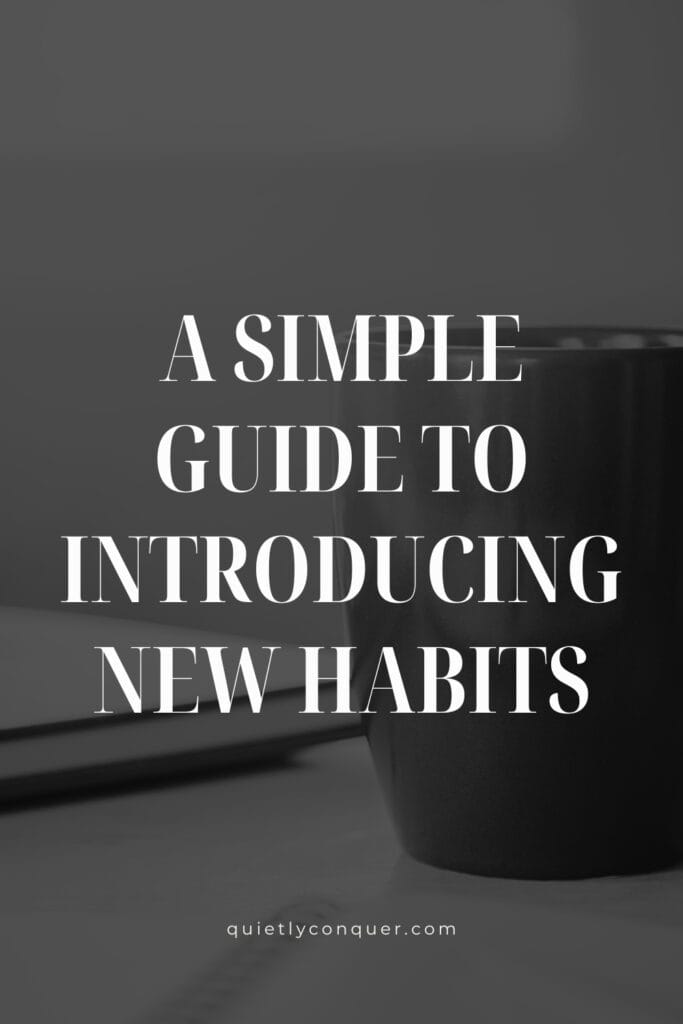
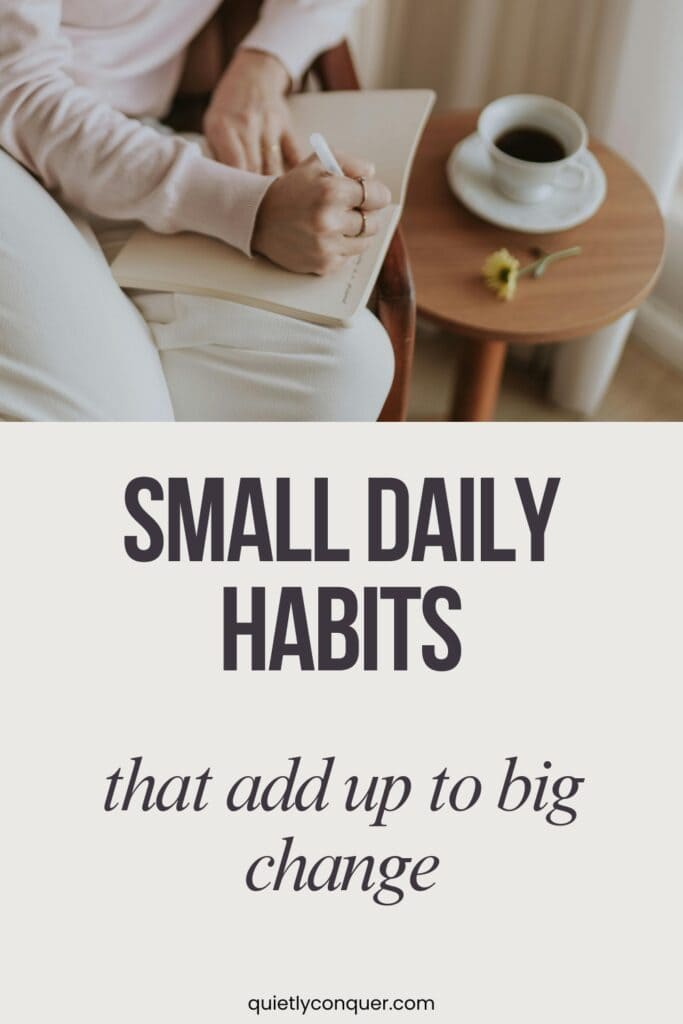
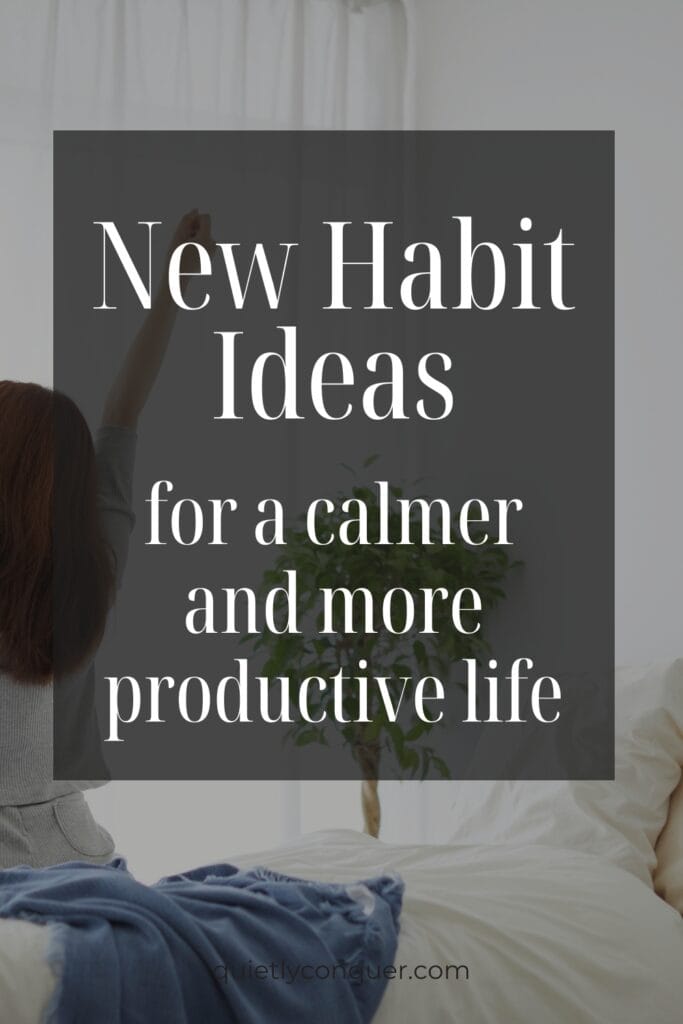
Meet Lynsey

Hey there! I'm Lynsey, a counsellor, coach and mentor for women who want to create change, but are feeling lost, uncertain and exhausted. With over 7 years’ experience of training, running businesses, and over a decade as a tutor and adult trainer, I've learned the value of a gentle and intentional approach to work and life that energises you without draining all of your energy.
I've lived with ME/CFS since 2011, and since then re-trained as a counsellor, and achieved a distinction for my Masters in Counselling and Psychotherapy Practice; all while running 4 businesses!
How? Improving your mindset, finding acceptance in yourself, and developing a gentle, but solution-focused approach to achieving goals is key. Knowing that it's not about how fast you move, but finding your own pace and trusting that you can achieve your goals in your own way, one step at a time.
If you'd like to know more about working with me, you can email [email protected] or find me on socials (links in the menu)
Have you seen my online store Quietly Conquer – Find DFY templates, downloads and more!



